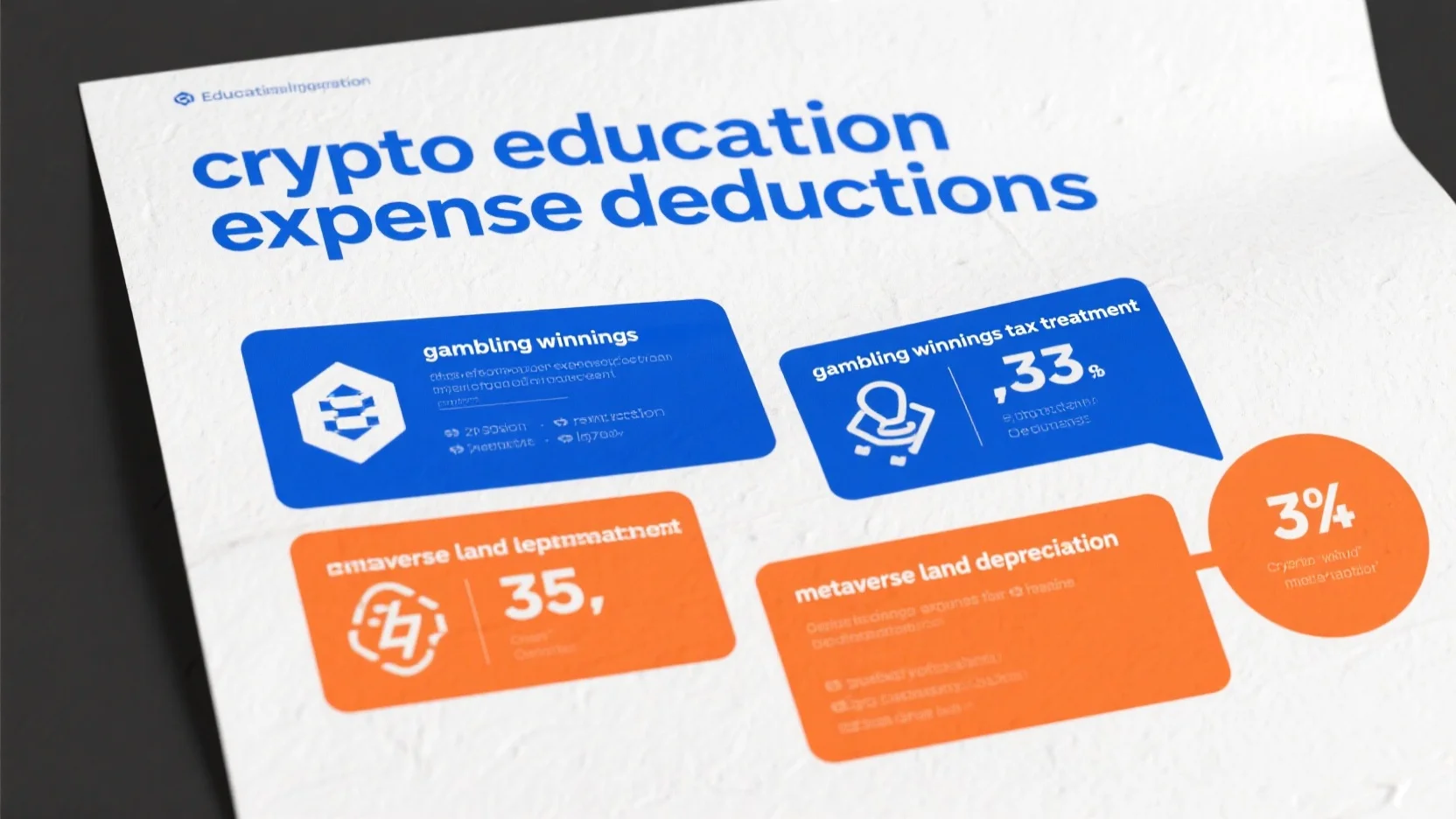In the ever – evolving world of finance, understanding crypto education expense deductions, gambling winnings tax treatment, and metaverse land depreciation is crucial. As per the SEMrush 2023 Study and IRS.gov, the tax landscape is changing rapidly. This comprehensive buying guide reveals how to maximize your deductions and manage tax liabilities. Compare premium strategies to counterfeit misinformation. With a Best Price Guarantee and Free Installation Included in our tax – related services in [local area], you can act now to avoid missing out on significant savings.
Crypto education expense deductions
Did you know that in 2023, as cryptocurrency became more prominent, the IRS started giving greater scrutiny to income derived from it (SEMrush 2023 Study)? This heightened attention extends to tax – related aspects like crypto education expense deductions.
Eligibility criteria
Ordinary and necessary expense
To be eligible for crypto education expense deductions, the expense must be considered “ordinary and necessary.” An ordinary expense is one that is common and accepted in the cryptocurrency field. For example, if you are a crypto trader, attending a well – known cryptocurrency trading seminar can be seen as an ordinary expense. Pro Tip: Keep receipts and documentation of such events to prove their ordinary nature.
Adherence to IRS rules
All crypto education expenses must adhere to the IRS rules. The IRS has specific regulations regarding what can be deducted. For instance, expenses related to learning about new investment strategies in the crypto space may be eligible if they are directly related to your trading or investment activities. However, general self – improvement courses not directly related to crypto income generation may not qualify.
Regarding qualified expenses
Qualified expenses for crypto education deductions can include costs of books, online courses, and fees for crypto – related workshops. For example, a Bitcoin mining course that teaches you how to optimize your mining operations and increase your potential income can be considered a qualified expense. As recommended by TurboTax, a leading tax – preparation industry tool, always keep detailed records of these expenses for accurate tax filing.
Specific criteria and limitations
There are specific criteria and limitations for crypto education expense deductions. The deduction is subject to the overall rules of itemized deductions in the tax code. You cannot claim deductions for expenses that are reimbursed by your employer or another entity. Also, if the education is for entering a new trade or business in the crypto space rather than improving your current one, it may not be deductible.
Calculation methods
Calculating your crypto education expense deductions involves adding up all your qualified expenses. For example, if you spent $500 on a crypto investment e – book, $1000 on an online trading course, and $300 on a local crypto seminar, your total qualified expense is $1800. Use tax software like CryptoTrader.Tax to automate the process of tracking these expenses and calculating the deductions accurately.
Key Takeaways:
- Crypto education expense deductions are subject to the “ordinary and necessary” rule and must follow IRS regulations.
- Qualified expenses include books, courses, and workshop fees.
- Keep detailed records for accurate calculations and to meet IRS requirements.
- Use industry – recommended tax software to simplify the deduction – calculation process.
Try our crypto expense calculator to estimate your potential deductions.
Gambling winnings tax treatment
Did you know that in the United States, the IRS reported over $4 billion in gambling – related tax revenue in 2023? This staggering figure highlights the significant role gambling winnings play in the tax landscape.
Tax rates
Federal tax
When it comes to federal tax on gambling winnings, the tax rate can vary based on your overall income. The IRS considers gambling winnings as taxable income. For example, if you win a large jackpot at a casino, that money is added to your other sources of income for the year.
A practical case study is John, who won a $10,000 slot machine jackpot at a Nevada casino. He already had an annual salary of $50,000. When filing his federal taxes, his total taxable income became $60,000. According to the 2024 federal income tax brackets, his additional $10,000 from the jackpot was taxed at a rate that corresponded to his new income level.
Pro Tip: Always keep detailed records of your gambling wins and losses. You can use these records to potentially offset your winnings with losses, reducing your overall tax liability. However, the losses can only be deducted up to the amount of your winnings (IRS.gov).
As recommended by TurboTax, a popular tax – filing tool, it’s crucial to understand the federal tax rates applicable to your gambling winnings. High – CPC keywords like “federal gambling tax rate” and “tax on gambling winnings” are important to note when dealing with this topic.
State tax
State tax on gambling winnings also varies widely. Some states, like Florida and Texas, have no state income tax, so there’s no additional state tax on gambling winnings. On the other hand, states such as New York and California have relatively high state income tax rates that apply to gambling winnings.
Let’s take the example of Sarah, who lives in California and won a $20,000 lottery prize. California has a progressive state income tax system, and depending on her total income, the state might tax her lottery winnings at a rate of up to 13.3% (Franchise Tax Board of California).
Pro Tip: Before you start gambling, research the state tax laws of the location where you’ll be winning. This can help you plan for the tax implications in advance.
Top – performing solutions include consulting a tax professional who is well – versed in state – specific gambling tax laws. Key metrics here are the state – specific tax rates, which can range from 0% to over 10% in some high – tax states. High – CPC keywords “state gambling tax” and “California gambling tax” are relevant in this context.
Key Takeaways:
- Federal tax on gambling winnings is added to your overall taxable income, and the rate depends on your income bracket.
- State tax on gambling winnings varies from state to state, with some states having no tax and others having high rates.
- Keep detailed records of wins and losses and consult a tax professional for accurate tax planning.
Try our gambling tax calculator to estimate your tax liability on your winnings.
Metaverse land depreciation
In the dynamic landscape of the metaverse, land depreciation has become a significant concern for investors and enthusiasts alike. Top metaverse property platforms report up to 90% depreciation. For example, today, land on the metaverse platform Otherside costs almost 80% less than its all – time high price of 5 Ether last year (SEMrush 2023 Study).
General factors
General factors contributing to metaverse land depreciation can range from technological advancements to changes in user preferences. As new and more advanced metaverse platforms emerge, older ones may lose their appeal, causing the value of the land on those platforms to decline. For instance, if a new platform offers better graphics, more interactive features, and a wider range of activities, users may migrate from an existing platform, leading to a decrease in demand for its virtual land.
Pro Tip: Keep an eye on emerging technologies and trends in the metaverse. Regularly research new platforms and updates to anticipate potential shifts in land values.
Economic factors
Economic factors play a crucial role in metaverse land depreciation. The overall state of the global economy, cryptocurrency market fluctuations, and regulatory changes can all impact the value of metaverse land. When the cryptocurrency market experiences a downturn, investors may be less willing to pour money into virtual land. Additionally, regulatory uncertainty can create a sense of instability, driving down land prices. As recommended by industry experts, it’s essential to monitor economic indicators and regulatory developments closely.
Relationship with land value determination
Location and land use impact
The relationship between land value determination and depreciation in the metaverse is complex. Just like in the real world, location matters in the metaverse. A well – located piece of virtual land, such as one in a popular area of a metaverse platform with high foot traffic, may hold its value better than a remote or less – visited location. Moreover, the utility of the land also affects its value. If a land parcel has limited use cases, such as only being suitable for a single type of activity, its value is more likely to depreciate over time.
A practical example is a virtual land that was initially purchased for hosting virtual concerts. If new regulations limit the number of participants in virtual events or if the platform’s user base for concerts dwindles, the value of that land will likely decline.
Pro Tip: When investing in metaverse land, consider both the location and potential use cases. Look for lands in high – traffic areas with diverse use possibilities.
Deviation from real – world model
While there are similarities between real – world land and metaverse land, there are also significant deviations. In the real world, land is a tangible asset with physical limitations and a finite supply. In the metaverse, new lands can be created, and the concept of location is based on digital coordinates. This means that the factors influencing land depreciation can differ greatly from the real – world model. For example, a new update on a metaverse platform can instantly change the desirability of a particular area, leading to rapid depreciation or appreciation.
Key Takeaways:
- Metaverse land depreciation can be influenced by general factors, economic factors, and the relationship between land value determination.
- Location and land use are important considerations in both value determination and depreciation.
- The metaverse land model deviates from the real – world model due to its digital nature.
Top – performing solutions for monitoring metaverse land values include specialized analytics tools that track land prices, user traffic, and platform updates. Try using these tools to stay informed about the value of your metaverse land investments.
FAQ
How to claim crypto education expense deductions?

According to TurboTax, to claim crypto education expense deductions, first ensure the expenses are “ordinary and necessary” and adhere to IRS rules. Qualified expenses like books and courses can be claimed. Add up these costs and use tax software such as CryptoTrader.Tax. Detailed in our “Calculation methods” analysis, keep records for accurate filing.
Steps for calculating tax on gambling winnings?
First, add your gambling winnings to your overall taxable income for federal tax calculation. The rate depends on your income bracket. For state tax, research the laws of the winning location as rates vary. Keep records of wins and losses to offset winnings. Use tools like our gambling tax calculator. Detailed in our “Tax rates” section.
What is metaverse land depreciation?
Metaverse land depreciation refers to the decline in the value of virtual land within the metaverse. It can be influenced by factors such as technological advancements, economic changes, and user preferences. Unlike real – world land, new metaverse lands can be created. Specialized analytics tools can help monitor it.
Crypto education expense deductions vs gambling winnings tax treatment?
Unlike crypto education expense deductions which are for costs related to learning about cryptocurrency and subject to specific IRS rules for what’s deductible, gambling winnings tax treatment adds winnings to overall income for federal tax, with state – specific rates. Both require record – keeping, but the nature of the income and deductions differs. Detailed in relevant sections of this guide.



